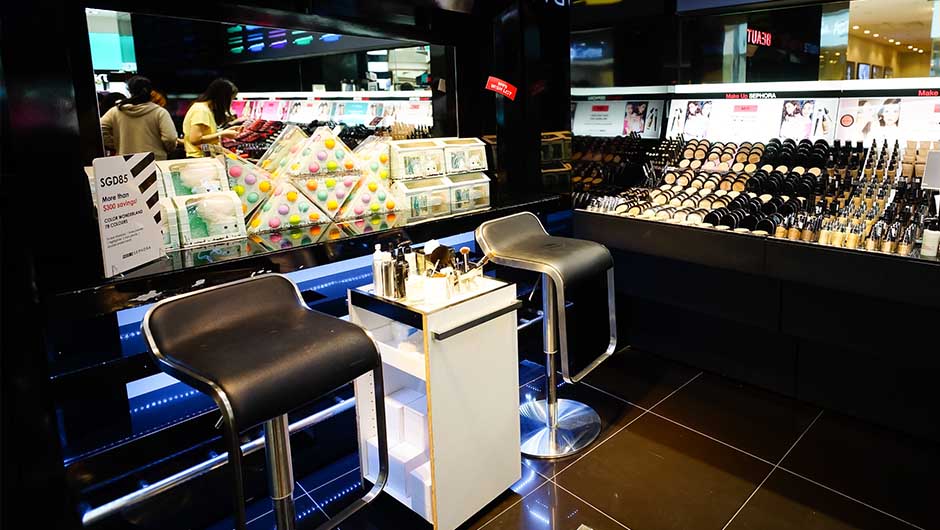
Picture this: You’re walking though Macy’s on a lazy Saturday afternoon. You’re not particularly looking to buy anything — you just wanted to peruse the shoe aisle or see what’s on sale in the handbag department.
But then, you walk by a makeup counter and a smiling face flashes you a new “gift with purchase” promotional deal. BOOM. Just like that, you no longer care about shoes, bags or anything else, and you’re chit chatting with “Melissa” about your crow’s feet.
Sound familiar? It happens to the best of us. For anyone that appreciates makeup, the beauty counter has a magnetism that’s hard to ignore. All those gorgeous makeup products laid out for your conspicuous consumption just beg you to buy, don’t they?
But while everything on and behind the makeup counter looks harmless and the salespeople seem as though they’re looking out for your best interest, the smart consumer has to wonder: Is it all too good to be true? What’s real and what’s fake behind the beauty counter business? Or better yet, what secrets are the brands behind these counters keeping from you in order to make you continue to come back and spend more?
To find out, we asked real women who work or have worked behind the counter in department stores across the country to spill the beans on what’s free and what isn’t, what’s a marketing ploy and what’s real, what they really think about customers, and much, much more.
Germs are everywhere
While most makeup counter artists and salespeople clean the makeup brushes (a common breeding ground for bacteria) after they use them from one customer to the next, you can never really trust any brush that isn’t yours, says one former Estee Lauder artist.
But “it’s not the brushes consumers should worry about, it’s really the products themselves,” she says. “No matter how many times a day the sales rep cleans them, people love to come stick their dirty fingers in the colors to test them. It’s amazing! Women walk right up to the counter, grab a lipstick tester and put it right to their lips. I think that’s one of the most shocking things about working at the counter — the general public’s complete disregard for bacteria,” she concludes.
They make things up
“Cosmetic training in a department store or beauty supply focuses mostly on sales and not about product knowledge, which is unfortunate,” says one former counter makeup artist.
“We do learn mediocre product information, but that doesn’t come until several months after working there, so we spend the first couple months making stuff up or sharing our limited experience,” she says. “I would generalize that most beauty advisors know a little more than what the average woman does about beauty,” and the ones that make “good money” off commissions are “sales people, not beauty experts,” she concludes.
The free makeover is NOT free
One of the biggest selling points of visiting the makeup counter is the “free makeover,” but what salespeople don’t tell you upfront is that the makeover isn’t really free.
Makeup artists at counters work on commission. So although you’re not obligated to buy anything, it is expected. “Technically it’s free, but we invest our time hoping you will become our next big customer. It’s like tipping — if you don’t tip your waiter, no one is going to come after you yelling and waving their fist, but you would leave feeling guilty. It’s just not courteous to get a free makeover when you have no intention of buying,” says a former counter makeup artist.
They keep an eye out for sample grifters
You can and should be asking your beauty counter salespeople to try samples of products before you buy them, but do know that they are taking note of how much you are “sampling” and how much you are actually buying.
“I would give them about two to three days worth [of product], not more than that. I am not supplying their skin care, I am just letting them touch, feel and smell,” says one former counter worker. But she warns “some beauty advisors have an on-going mysterious hostility with their customers and will not waste product on someone who won’t buy.”
You can get a refund on almost anything
While the return policies differ, most big department stores like Nordstrom and Macy’s are notorious for giving full refunds or store credit back for products that have been used — and used more than once. You can test a makeup product several times before you decide whether it’s right for you.
One former salesperson said that Nordstrom’s policies are so lax that they were even giving cash back to a man that they knew was stealing perfumes off the counter of the nearby Macy’s and “returning” them to Nordstrom. Why? Because “they didn’t want to make a scene in the store.”
